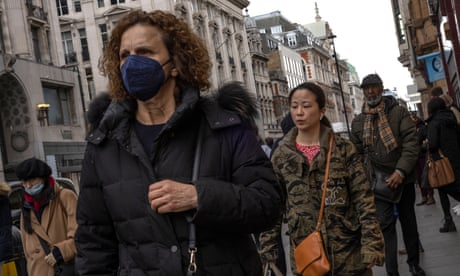Having somehow dodged Covid since the pandemic kicked off, the proportion of people who have never seen the red line appear on a rapid test are a steadily shrinking minority. On Thursday, the White House announced that the US president, Joe Biden, had tested positive for Covid , becoming the most high-profile figure yet to join the increasingly exclusive club of people who are only now, in the third year of rife disease, notching up their first infection. Figures from the UK Health Security Agency (UKHSA) are striking on this.
About 15% of people in England have never had Covid. But in the current wave, driven by the BA. 4 and BA.
5 subvariants of Omicron , this minority group still accounts for 55% of infections. How can so few be contributing so much? There are, as ever with Covid, multiple forces at work. In a textbook pandemic, the proportion of first-timers who get infected is expected to drop from 100% in the early days to a much smaller number as the bug eventually infiltrates every niche of society.
Ultimately, the only people unexposed tend to be babies and young children. Not that we will reach this point soon. Going into the latest Covid wave in England, the UKHSA estimated more than 10 million people had still never been infected.
“It will take a while to get there,” says Bill Hanage, an associate professor of epidemiology at Harvard. The decline in first-timers getting infected may not be a smooth one as the pandemic plays out. People’s behaviour (such as whether they shield or reduce social contacts), their immunity, and new variants all exert an influence on that downward trend.
Even though 55% of Covid infections in England are first-timers, this is the lowest it has been since the start of the pandemic, except at the peak of the first Omicron wave, driven by the BA. 1 variant in December. Looked at another way, 45% of cases are now reinfections, the highest the figure has ever been, or at least very close to it.
Sign up to First Edition, our free daily newsletter – every weekday morning at 7am BST There is good reason for first-time infections to seem even more common than the data suggests. The first encounter with Covid is often the worst , with subsequent infections usually being milder . Across the population, this can skew awareness: many people on their second, third or fourth infection may never even realise they have caught it again.
“If infections after the first are less likely to be symptomatic, or less likely to be seen by the public as ‘test worthy’, then there will be many people who are being reinfected but not noticing, so that first infections are far more likely to be diagnosed and reported,” says Graham Medley, professor of infectious disease modelling at the London School of Hygiene and Tropical Medicine. Hints as to why slightly more first timers are being infected now than in the first Omicron wave may be found in who got the virus and when. According to UKHSA Covid and flu surveillance data , the first wave of Omicron sent case rates soaring among people in their 20s, 30s and 40s, but far less so in older people.
The nation was braced for a “tidal wave” of Omicron , as Boris Johnson called it, and mass testing was still in place, so people were not only wary but well equipped to avoid spreading Covid to older relatives. When the next waves arrived – fuelled by BA. 2 in March and the double act of BA.
4 and BA. 5 in June – masses of younger people were well protected by their recent infection on top of vaccination. According to work from Qatar , a recent BA.
1 infection is nearly 80% protective against BA. 4 or BA. 5.
In the event, the BA. 2 and BA. 4/BA.
5 waves sent infections sky high in older age groups – who are more likely to be first-timers – with case rates highest in the over-60s. Other factors will have played into this: after the first Omicron wave, plan B measures to curb the virus – such as working from home and compulsory mask-wearing – were dropped, and the “living with Covid” plan scrapped most free testing and the requirement to self-isolate. It was easy to think the pandemic was over, even for those who had swerved the virus until then.
Another factor at work is that, as older people contract the virus, they spread it to others of a similar age, who like them are more likely to be first-timers. Hanage explains it by proposing two separate outbreaks, one in a busy left-leaning newsroom , the other at a bridge club for the over-70s. In the newsroom, many people have been vaccinated but also recently infected by BA.
1 or BA. 2, giving them robust “hybrid immunity”. If a staffer brings the infection into work, there is only so far it can go.
Covid levels still rising in England and Scotland with 3. 5m infected Read more But it is a different story at the bridge club. There, an infectious player is more likely to spread it to someone who has never been infected before, and whose protection against infection is not that strong.
They are then more likely to pass it on to other first-timers. None of this is good news. “Introductions of BA.
5 are more likely to transmit well within these groups that have not previously been infected,” says Hanage. “And because of the escalating risks of severe disease in older people – even those who have been vaccinated – we can expect the serious consequences of these infections to be more numerous than if they were happening in younger folks who have already been infected. ”.
From: theguardian
URL: https://www.theguardian.com/world/2022/jul/22/why-do-the-minority-who-havent-had-covid-account-for-most-new-infections



